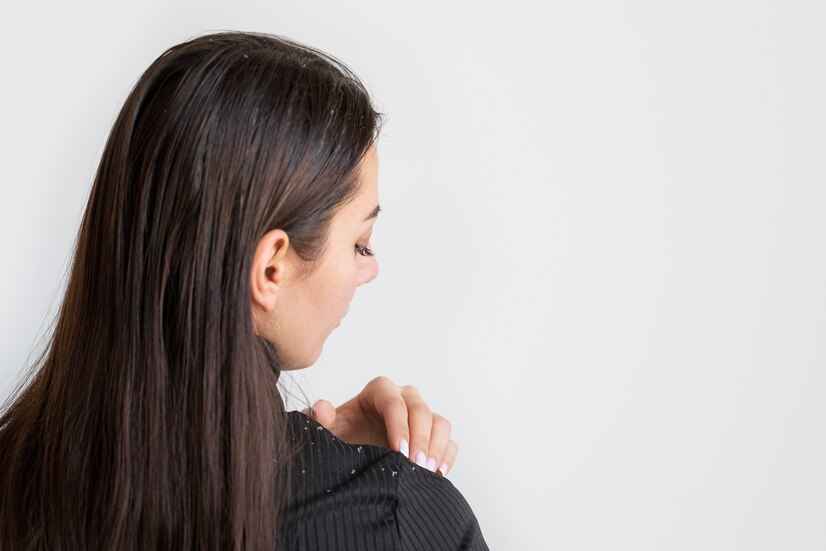Does your dandruff get worse in the winter? It is because there is less moisture in the air that makes the scalp dry and makes the environment susceptible to dandruff. Read this blog where you can find ways for winter dandruff treatment.
What is Dandruff?
Dandruff is a common hair condition that affects most people worldwide. In this, people experience irritation on the scalp and white-coloured flakes. Dandruff is not contagious or serious, but regular itching and irritation can lead to inflammation and hair fall.

A person with dandruff can experience symptoms such as dryness of the scalp, white flakes, itching, and irritation. Dandruff can be caused by various factors, such as irritated, oily, or dry skin. Other reasons include sensitivity to hair care products like shampoos and skin conditions like psoriasis and eczema.
Why does dandruff in the winter get worse?
In winter, most people deal with hair conditions like dandruff because of the improper balance of moisture in the skin. It is the most difficult time for people to have dandruff as the skin becomes drier, which leads to excess flaking of the skin. The winter season requires optimal care of your hair to prevent the buildup of dandruff.
What are the reasons for dandruff in the winter?

Various reasons can lead to worsening dandruff problems in winter, and these are as follows:
- Excessive dry scalp in the cold season can lead to more oil production on the scalp, which can lead to white, scaly, and itchy flakes.
- Wearing caps in winter to protect from the cold can also be the reason for dandruff occurrence.
- Due to the decreasing temperature, people do not wash their hair that often. It can lead to matted hair that attracts oil, dust, and germs to the scalp.
- Stress can be another reason for having dandruff in the winter and cause hormonal changes within your body.
Winter Dandruff Treatment: How to Prevent It?
Winter Dandruff Treatment: In Ayurveda, it is believed that any problem in the body occurs because of the imbalance in the doshas like Vata, Pitta, and Kapha. Any disturbance in these three doshas can lead to dandruff problems. Several ways can help prevent dandruff as well as winter dandruff treatment and those include the following:
- Natural Remedies

Using certain natural remedies, such as apple cider vinegar, honey, and lemon, can help you get a dandruff-free scalp.
- Apple cider vinegar has mild antifungal properties that reduce the overgrowth of yeast-like fungus on the scalp.
- Lemon, rich in vitamin C, promotes a healthy scalp and has antibacterial properties that limit the buildup of dandruff on the scalp.
- Honey has antioxidant and moisturising properties that maintain the moisture on the scalp and promote a healthy scalp.
2. Reduce Stress
Stress is one of the main reasons for itchy and flaky scalps. To prevent yourself from having dandruff, you must reduce the stress that triggers it. You can practice relaxation techniques and breathing exercises to reduce stress.
3. Have a Look at Your Diet

Diet plays a very important role in managing and getting rid of dandruff. Include vitamin B, zinc, and omega-3 in your daily meals. You can eat fresh fruits and salads, which are excellent sources of the above-mentioned nutrients.
4. Hydrate Yourself
During the winter, we usually drink less water than in the summer, which can dehydrate the skin and hair. Therefore, start drinking four litres of water a day to keep yourself hydrated.
CONCLUSION
Winter season can trigger dandruff in many people. That’s why you have to limit some contributing factors that can worsen the situation. There are various ways, like avoiding direct heat, limiting sugar, applying allicins, and oiling your hair before every head wash, to prevent dandruff.
Experiencing severe dandruff? Reach out to Ayursparsh Clinic and Panchakarma Center, a wellness center in Dharwad, Karnataka, to treat various hair conditions.
You can also get a personalised treatment plan for your specific situation from Dr. Rashmi C. Patil, MD (Ayu).




